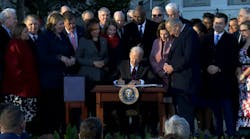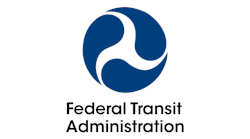L.A. Metro receives $893 million FTA grant to support new 6.7 mile East San Fernando Valley light rail project
The Federal Transit Administration (FTA) awarded the Los Angeles County Metropolitan Transportation Authority (L.A. Metro) an $893.3 million grant to support the construction of the new East San Fernando Valley Light Rail Transit Project. The 6.7-mile rail line will run along Van Nuys Boulevard in East San Fernando Valley.
"Traffic and air quality are two longstanding challenges that Los Angeles has been working hard to fix – and today they're getting a big hand from the Biden-Harris Administration through our Bipartisan Infrastructure Law," said U.S. Department of Transportation Secretary Pete Buttigieg. "We're proud to award $893 million to help build a new light-rail line along Van Nuys Boulevard that will reduce vehicle congestion, improve air quality and provide residents an efficient and affordable to way to get where they need to go."
The line, which serves as phase 1 of the East San Fernando Valley Transit Corridor, will improve reliability, lessen congestion, and create new connections to other transit services in the area including Metrolink’s Ventura County Line, Amtrak, L.A. Metro’s G (Orange) Line, L.A. Metro’s B line and future services in the works. The 2.5-mile northern segment of the corridor is under further study that would extend rail service from Pacoima, Calif., to the Sylmar/San Fernando Metrolink station.
This project brings the first local stop, commuter rail service to Nuys Boulevard in more than 70 years. The last Pacific Electric San Fernando Valley Line urban electric railway rolled down Van Nuys Boulevard in 1952.
"This project is significant for residents in the Valley by providing a fast and frequent rail transit option for the first time," said FTA Acting Administrator Veronica Vanterpool. "Adding transit service in busy downtown corridors helps reduce traffic jams and alleviates the climate impact that comes with them."
Running along one of the area’s busiest corridors, the new light rail will improve mobility for the communities of Van Nuys, Panorama City, Arleta and Pacoima. About 19 percent of households in this area do not have access to their own car and depend on public transportation, compared to 8.8 percent transit dependency for L.A. County.
“This $893 million grant will enable us to finally bring light rail back to the Valley and we thank the Biden-Harris Administration and the L.A. County Congressional Delegation for making this critical investment in our region’s future,” said L.A. Metro CEO Stephanie Wiggins. “Thirty-five percent of households in the East San Fernando Valley depend on [L.A.] Metro for their transportation and the East San Fernando Valley Line will give them faster and more efficient service than ever before. Now that this funding is in place, we look forward to breaking ground on this line in the coming months.”
Los Angeles City Council President and L.A. Metro Board Member Paul Krekorian added, “The San Fernando Valley deserves a major transportation investment like this and has needed it for decades. I’m happy to say it’s finally becoming a reality. With its connections to the G and the B Lines in North Hollywood, East San Fernando Valley Light Rail will turbocharge transit usage in the San Fernando Valley and fulfill the dream of safe, efficient, sustainable transportation for everyone who calls the Valley home.”
The project includes 11 stations, 33 light-rail vehicles and extensive street and sidewalk improvements along the route. A public-private partnership will design and support a solar power system to supply approximately 70 percent of the power for the maintenance and storage facility using clean energy, lowering operating costs for L.A. Metro while reducing greenhouse gas emissions and improving air quality.
L.A. Metro is now conducting advanced utility adjustment work for the $3.57-billion project. Construction of utility work and minor street improvements along Van Nuys Boulevard is expected to start later this year, with the line currently forecast to open in 2031.
The project contract also includes L.A. Metro’s first Cultural Competency requirement, taking into consideration the local community’s diverse cultural heritage and background. L.A. Metro says the comprehensive plan will consist of several targeted strategies to genuinely and respectfully engage with community stakeholders impacted by the project.
“This is the first [L.A.] Metro rail project that includes a Cultural Competency Plan outlining a comprehensive engagement strategy, including workforce training and business opportunities to support the diverse communities that reside along this important Valley corridor,” said L.A. Metro Board 2nd Vice Chair Jacquelyn Dupont-Walker. “I’m so pleased that [L.A.] Metro’s contractor will be doing its part to ensure all residents, local businesses, community groups and institutions are informed of and understand what is being built in their neighborhoods and what new opportunities and partnerships the rail line will offer them.”
Construction and operation of the project is anticipated to create more than 18,000 direct and indirect jobs, including those now covered by new local hire rules under the federal infrastructure bill. L.A. Metro notes it plans to implement a Project Labor Agreement/Construction Careers Policy local hire program to ensure residents can secure good paying jobs to build the project. Once the new rail line is completed, riders along the new rail line will be connected to 150,000 jobs.
This marks FTA’s first grant award under the Expedited Project Delivery Pilot Program and will be delivered through a multi-year Full Funding Grant Agreement.

Megan Perrero | Editor in Chief
Megan Perrero is a national award-winning B2B journalist and lover of all things transit. Currently, she is the Editor in Chief of Mass Transit magazine, where she develops and leads a multi-channel editorial strategy while reporting on the North American public transit industry.
Prior to her position with Mass Transit, Perrero was the senior communications and external relations specialist for the Shared-Use Mobility Center, where she was responsible for helping develop internal/external communications, plan the National Shared Mobility Summit and manage brand strategy and marketing campaigns.
Perrero serves as the board secretary for Latinos In Transit and is a member of the American Public Transportation Association Marketing and Communications Committee. She holds a bachelor’s degree in multimedia journalism with a concentration in magazine writing and a minor in public relations from Columbia College Chicago.





